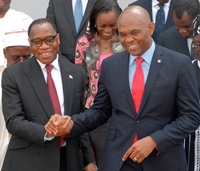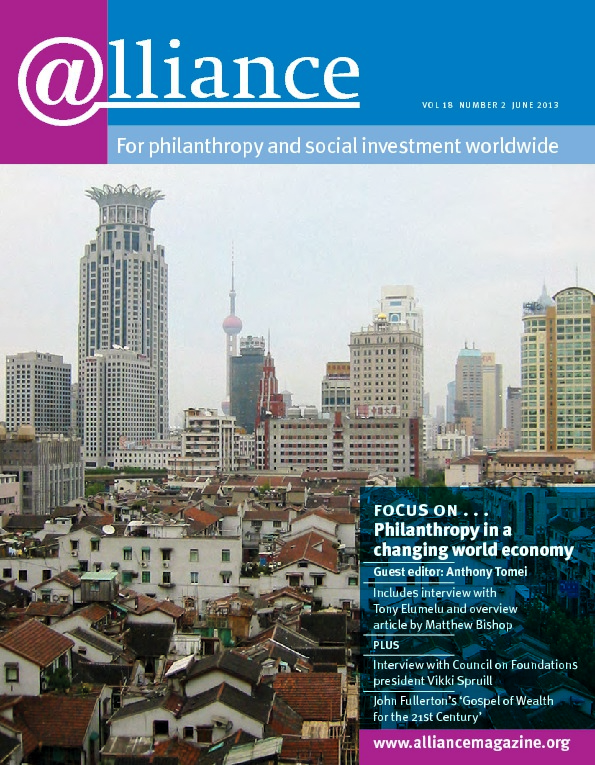‘For Africa the issue of commercial vs impact investing is not important. What is important is investing in sustainable solutions.’
In 2010, leading African businessman Tony Elumelu set up the foundation that bears his name. Africa-based and African-funded, its principal focus is on strengthening the private sector across the continent, as he explains to Caroline Hartnell.
According to your foundation website, ‘Africa …[has] the highest concentration of rapid-growth economies … and is the region where the best returns on investments are possible.’ It also has big problems of poverty, inequality and underdevelopment. How can commercial investment help to address these issues?
At the Tony Elumelu Foundation (TEF), we believe that these can be addressed by the active participation of the private sector. I believe in the philosophy I call ‘Africapitalism’ – the private sector’s commitment to development through long-term investment that creates economic prosperity and social wealth.
Stephen Dawson’s Jacana Partners is focusing on building up a venture capital industry in Africa to support SMEs. What do you think of this approach?
Today [5 April] in Cape Town, TEF and the Rockefeller Foundation launched the Impact Economy Innovation Fund. The aim is to help build the infrastructure required if we want the private sector to do well in investing in double bottom line opportunities such as equipping African business incubators or supporting impact-oriented businesses. So, for those who focus on SMEs, making investments in the sector is important.
TEF is engaged in a myriad of interventions. We use all the resources we have – financial, networking, convening – to help improve the business climate. We also make investments in projects we think will have catalytic impact or help deal with social issues, but with profitability and sustainability in mind. For instance, we recently invested in creating the African Commodity Exchange Holding Company whose first investment is in a commodity exchange in Rwanda to serve East Africa. This can make a huge contribution to dealing with poverty in a more sustainable way. Africa remains primarily an agrarian economy and a vast proportion of the population is involved in farming, so if you help that segment, you will play a key role in poverty eradication or reduction.
We also try to mentor aspiring entrepreneurs and to create networking platforms. Recently, we assembled the CEOs of the 50 fastest-growing unlisted companies/SMEs in Nigeria and brought in Michael Porter, who is the founding patron of TEF, from Boston to talk to them. I also shared my own experiences of building a pan-African financial services multinational.
How do you see the role of impact investing?
For Africa the issue of commercial vs impact investing is not important. What is important is investing in sustainable solutions for social and environmental issues. I will give an illustration: when I was in my previous role, we took over a bank in trouble and turned it around. You could say this was a commercial investment, but that investment has also facilitated economic development in various ways: the bank has 1,000 branches, which is real estate utilization and also creates access; it has created 25,000 direct jobs; and it helps to facilitate payments, investment and trade across Africa.
So we have a commercial side and a philanthropy side. The commercial side does commercial investing and the philanthropy side does impact investing. But they are interrelated and sometimes both are involved in the same investment. If we invest in the power sector in Nigeria, that is both a commercial and a social investment because many Africans have no access to an energy supply.
I understand that your foundation practises ‘catalytic philanthropy’? What do you mean by this?
You can practise more traditional forms of charity but, while it addresses immediate needs, it does nothing to break the cycle of poverty. So we feel that we should help to catalyse African societies through interventions like impact investing and support for entrepreneurship. Then we can use our political capital to help make sure the right policies are put in place to help small farmers or small fishermen to grow to national or continental scale. This is why we say our philanthropy engagement is catalytic. It is not just about donating money – it’s about leveraging all the tools at our disposal to create impact for our beneficiaries.
 Your website says that you see grants as a last resort. Aren’t there some causes, like human rights, that can only be supported by grants?
Your website says that you see grants as a last resort. Aren’t there some causes, like human rights, that can only be supported by grants?
Resources are limited and so we’re forced to make choices, and we want to make the maximum impact. Africa lacks power, which is something we’ve invested in and which has a significant impact on society. Also, TEF has a specific skill set, forged in business success, so that’s what we have to use. We don’t limit ourselves to SMEs or private equity; we’re interested in the infrastructure of the private sector and that means assisting government too. We recently played a leading part in creating a Competitiveness Council in Nigeria. This is part of the bedrock of a healthy private sector. (Pictured: Tony Elumelu (on the right) with the Minister of Trade and Investment Olusegun Aganga at the launch of the National Competitiveness Council of Nigeria.)
But you don’t rule out grantmaking altogether?
There are certain emergency situations that require grants but first and foremost our philosophy is to support the private sector as a way of addressing social, economic and environmental issues in Africa. The primary aim of Africapitalism is to make commercial investments, but ultimately you should be creating social wealth. Investing in creating railways or producing power or in commodity exchanges – all these potentially address economic, social and environmental issues. The commodity exchange that was just put in place is a 50/50 joint venture between African and western investors. That is a demonstration of the concept of Africapitalism: we show an interest and our partners follow us in investing, thus helping millions of Africans.
Do you think the Giving Pledge could have a role to play in Africa?
Yes, I do. As a foundation, we believe that we have a catalytic role to play not only through our interventions but also by getting other wealthy Africans to come into the philanthropy space. Traditionally, Africans love to give, but at times knowing how to go about it and put their philanthropic visions into practice can be a big challenge. So last month, in partnership with the government, we had the first ever convening of philanthropists in Nigeria. Our aim was to tell people, yes, please let us be philanthropic with our resources but let us be strategic and collaborative, too, so that we touch millions in a sustainable fashion.
A priority, therefore, is an environment that is organized for giving and that has a shared view of how giving should be in practice. So before we look at making pledges, we should put in place proper platforms and legislation on philanthropy. Together with other philanthropists and NGOs in Nigeria, we have submitted draft legislation to the government, and we’d like to work with fellow African philanthropists to get this done across the continent.
We are also working with the Global Philanthropy Forum to host the first convening of African philanthropists next year. We want to create awareness that philanthropy should be strategic. If we can get six or seven strong foundations, I think the Giving Pledge can then be the icing on the cake.
How important is it to have Africans investing in Africa?
I believe strongly that only Africans can develop Africa. If you ask me to invest in a business, and you are investing too, that increases my confidence. If you are preaching investment but you do not have a stake in it, I am not likely to take you very seriously. So, from the point of view of investment, Africans for Africa and our associates and friends will follow.
From the point of view of philanthropy, too, when you see African foundations that understand the more pressing challenges of the environment, it will be easier for foreign counterparts or philanthropic partners to work with them to provide solutions.
Partnerships are a key part of our strategy and I am very excited about the partnership we have launched with the Rockefeller Foundation in South Africa. This is a clear demonstration of an African foundation that understands African challenges working with willing partners to put in place a mechanism to solve those challenges. That is the way I believe we should be thinking going forward.
About Tony Elumelu
Tony O Elumelu, CON, is an entrepreneur, a philanthropist and the chairman of Heirs Holdings Limited, a pan-African proprietary investment company with interests in strategic sectors of the economy. He founded the Tony Elumelu Foundation in 2010, the same year he retired as Group CEO of United Bank for Africa Plc (UBA), which he transformed from a single country bank into a Pan-African bank serving over 7 million customers in 20 countries.
@TonyOElumelu
http://www.tonyelumelufoundation.org






Comments (0)